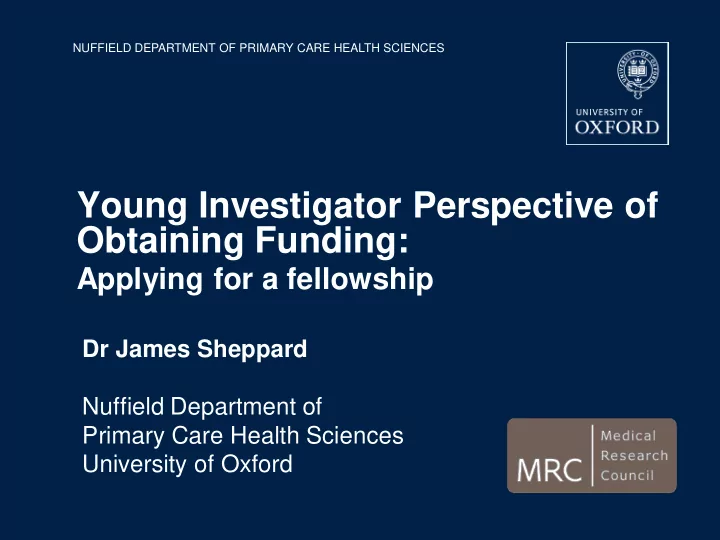

NUFFIELD DEPARTMENT OF PRIMARY CARE HEALTH SCIENCES Young Investigator Perspective of Obtaining Funding: Applying for a fellowship Dr James Sheppard Nuffield Department of Primary Care Health Sciences University of Oxford
What we’ll cover Planning your application Completing the application form Preparing for interview Peer review/feedback ‘Tips’ for the top
Make a plan Starting thinking about it early – at least 18 months before the end of you current contract Find more than one fellowship to apply for Research Council, NIHR, charities Clinical/non-clinical
Making the most of your CV Publications 3 published papers (2 papers and 1 protocol) 2 articles in press (including 1 letter) Small grants/travel awards/prizes Small SPCR project grant (£35,000) Presentations Peer review Teaching
What fellowships do the MRC offer?
What are the MRC looking for? “The MRC’s fellowships are personal awards to talented researchers at key points in their careers. Fellowships provide funding for a challenging research project and an ambitious programme of research training and personal development .” A project with scientific and clinical interest Interesting and novel Integrated training plan Oversees travel
Planning a project and training plan Don’t be too ambitious Try not to plan workstream 1 leading to workstream 2 leading to workstream 3 Avoid to much new data collection CPRD, systematic review (+/- IPD), re-analysis of trial data Training courses at other centres MSc? PGCert? Collaborate Other departments Oversees (data sharing?) Consider moving to a different institution
What happens after you submit your app? External peer review Shortlisting Panel interview
Preparing for interview Read up on the topic Have a mock interview early Prepare a response to every criticism of you application Find out who’s on the panel Think about your ‘10 year career plan’
What happens next? 1 week until decision 1 month until confirmation of the final award MRC induction day (September/October) Fellows’ day (May)
Peer review Is there any pilot work? “ The pilot work is reported with some incorrect and some naive analyses used.” “ The pilot data is clearly a strength of this proposal .”
Peer review Comment on the applicant’s PhD “The PhD considered only 18 subjects, and did not appear to give a clear comparison with alternative approaches. The statistical presentation was not strong .” “The applicant is a basic scientist moving into the primary care research field. Both the applicant and the sector are likely to benefit from his rigorous training in the scientific method”
Peer review How do you rate the candidates ability to complete the proposed research? “ The statistical analyses would be better done by a competent statistician, in perhaps a month, rather than by a weak social scientist .” “Future output is best predicted by past performance and he is very likely to be able to complete the proposed work .”
Peer review Is the training plan appropriate? “ Do not attempt stats training .” “The training plan seems well-thought out and appropriate .”
Peer review Overall quality of proposed research? “Uncompetitive” “Very interesting, important proposal” Overall assessment? “Poor candidate and application” (Score: 1 out of 4) “Very high / Excellent” (Score: 4 -5 out of 6)
‘Tips’ for the top! Prepare well in advance Take the initiative Be persistent Speak to other people (+ use the RDS)
Thank you for listening! Email: james.sheppard@phc.ox.ac.uk Twitter: @jamessheppard48
Recommend
More recommend